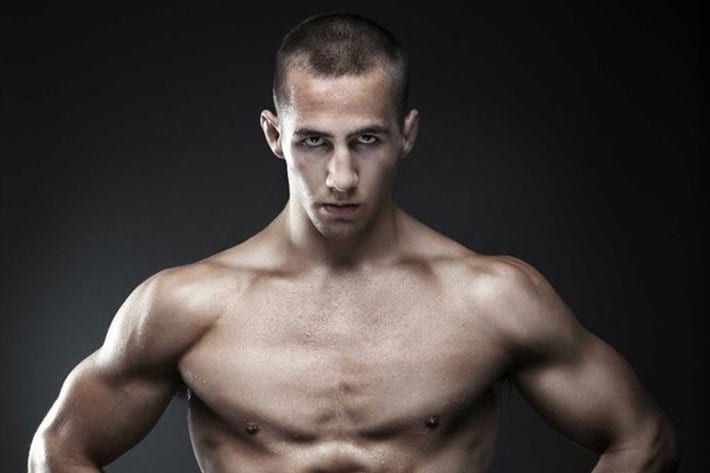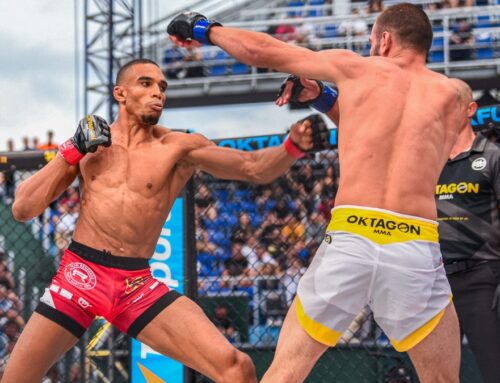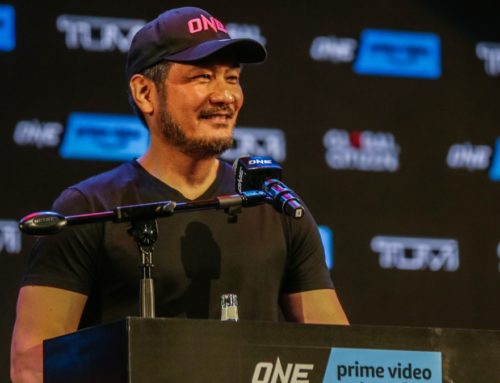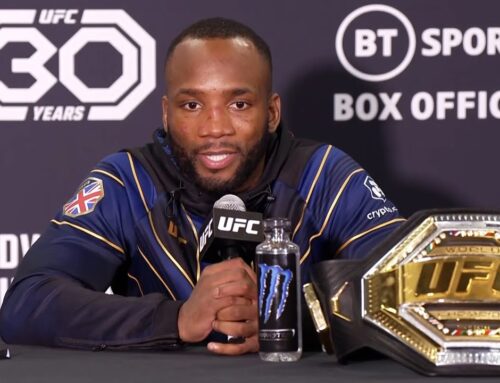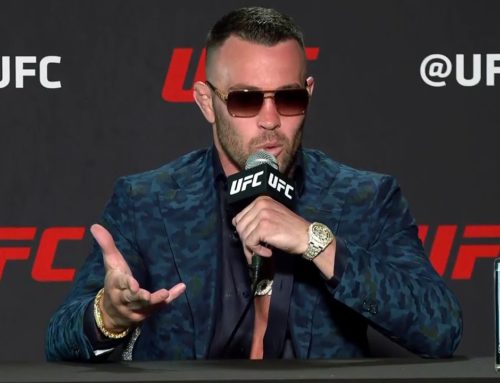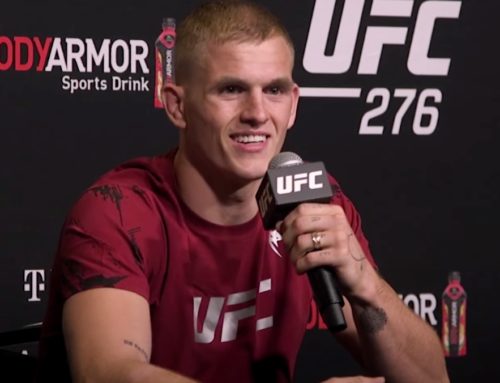Rory MacDonald has an aura. We know this by now. Hard-to-read, slightly unnerving, it’s with him when he’s in the cage on fight night, it’s with him during interviews and it’s with him when it shouldn’t even necessarily be with him. It’s the kind of aura that serves to intrigue and confuse those who don’t know the 27-year-old. They call him weird because of it. An oddball. A serial killer. Strange. But Rory, we’ve come to understand, is just being Rory, and this aura, if anything, is merely a reflection of his driven mindset and the nonchalance with which he tackles a sport he has done since childhood.
“It surprises people when I was say I was born to fight, but it’s true,” he said. “My interest in mixed martial arts started when I was very young and still at school. My brother, my dad and I would sit around and watch early UFC video tapes at home and then I’d go outside and slug the heavy bags that my father had hung up in his yard. I would repeat the punches and kicks that I’d seen my UFC heroes use on television and nothing excited me more as a kid.
“I’d always had an interest in MMA, but wasn’t able to do anything about it until I found an MMA gym at fourteen and started training. I loved the training and couldn’t get enough of it. I quit all the other sports I was doing, including hockey, and focused entirely on dedicating my life to becoming a great mixed martial artist.”
You can picture Rory MacDonald at school. Alone a lot of the time, he’d be the kid daydreaming and clock-watching in the back of class. The kid eyeing up bullies to thump. He’d think not of timetables but fight schedules, not of equations but submissions. Unapologetically single-minded, there’d have been a Ray Babbitt-like intensity to his focus, an unwavering belief that school was merely a necessary stopgap en route to something much more fruitful and fun.
“Mixed martial arts took over my life and it was often all I thought about when I was at school,” he admitted. “If I was sitting in a lesson and bored, I’d be thinking about training. If I was eating lunch at lunchtime, I’d be thinking about training. If I was counting down the minutes until the school bell rang, I’d be thinking about training.
“Nobody at school believed me when I told them I was planning on becoming a professional fighter and it got to the point where I actually hated telling people about it. They all just assumed Rory was telling another lie. I wasn’t a super popular kid at school and not many people put a lot value into the stuff I was saying at fourteen. I was small and shy, and didn’t think the way a lot of the kids in my class did. I was, after all, thinking of becoming a fighter. I also didn’t look anything like a fighter. I was scrawny and timid and wasn’t the type to get involved in fights at school. To be honest, I still don’t even look like a fighter now, so I can understand my classmates not wanting to believe me.”
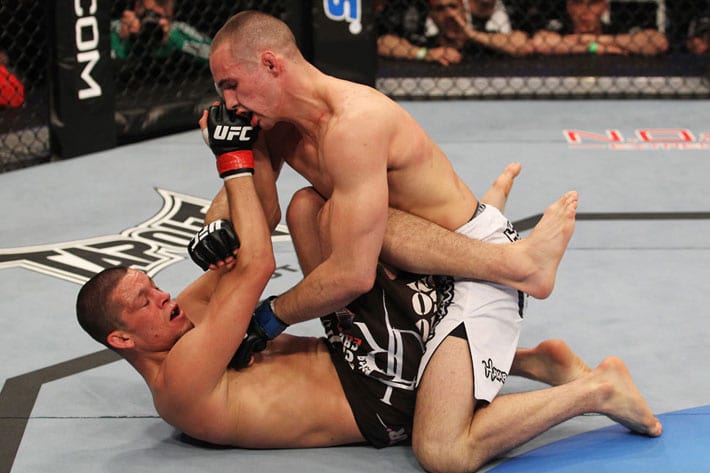
Something of a fighting prodigy, MacDonald was just sixteen years of age when he gave school the cold shoulder and turned professional as a mixed martial artist. The year was 2005 and mixed martial arts had still be diluted and translated to the masses by three letters – UFC. This, of course, made MacDonald’s decision to pursue the sport as a career option, before he was even able to drive, all the more galling to classmates and presumably everybody else he encountered, outside his family, in Quesnel, British Columbia. Chances are, though, knowing what we now know of MacDonald, this was all part of the thrill.
“All the kids from school now know I wasn’t lying,” he said. “Fighting never felt like a risk to me. It didn’t feel like something that would be uncomfortable or challenging. As soon as I started training towards becoming a fighter at fourteen, I knew the sport would be with me for the rest of my life. It was a gradual process, but at no point did I ever doubt whether I’d be good or strong enough to do it.”
MacDonald’s professional MMA debut took place on October 15, 2005 in Prince George, British Columbia, and was wrapped up inside three minutes. His opponent, Terry Thiara, was submitted by a rear-naked choke. MacDonald, in his own words ‘scrawny’ and ‘timid’, was on the board as a winner; just as importantly, a professional fighter. Yet, straightforward though the fight was, MacDonald now understood why so many initially opposed his decision to sign up to the hurt business.
“I was very nervous ahead of my pro debut, as all my family were in attendance and I still didn’t really know what to expect from the sport,” he remembered. “Training is one thing, but actually competing is a different proposition altogether. I didn’t really know how to deal with the build-up to the fight – the waiting, the thinking, the walking to the cage and that whole process. Normally, if I got into a fight at school or at home, it would happen spontaneously. You wouldn’t have all that time to think about it and you never gave nerves a chance.
“However, I quickly realised pro fighting was as much to do with who could keep their nerve on the night as it was who could land the best shot. My legs were shaky as hell in that first fight, and I really didn’t know how to control my body or mind. I still get nervous even now, but experience allows me to deal with it far better than I did back then. Georges St-Pierre and Jon Jones both say they experience butterflies but make them fly in formation. I love that saying.”
A boy in a man’s world, MacDonald won each of his first four fights via first-round knockout; a tough, brutal and unforgiving sport was made to look easy by a Canadian simultaneously battling puberty.
Even so, on paper at least, the early match-ups hardly seemed fair. After all, here was little Rory MacDonald, an underdeveloped, paler-than-alabaster teenager, being paired with grown men, typically taller, heavier, stronger, and asked to fight them. It seemed a recipe for disaster.
And yet.
“I won all my fights pretty easily to begin with, and that undoubtedly gave me a lot of confidence,” he recalled. “I was fighting guys in their twenties but they couldn’t do anything to me. Even as a tiny sixteen-year-old kid, I felt invincible. It was too easy for me. I was brought along slowly and properly by my manager, David Lee, and at no point did I feel rushed or out of my depth. It all felt so natural to me.”
The look on his face today, as he prepares to fight Paul ‘Semtex’ Daley at Bellator 179 on Friday (May 19), is not a look of awkwardness or the look of a weirdo or the look of a ‘killer’. It is, instead, the look of a natural, now 27, someone who knows nothing but to fight, someone born to do this, someone still doing the thing he loves.

